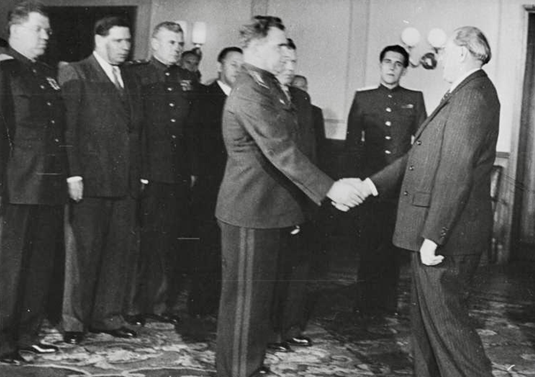In the Face of Total Annihilation
- Maria A. Kithcart

- Jan 19, 2022
- 3 min read

Pictured: Stalingrad in ruins; Lieutenant-General V. I. Chuikov at the 62nd Army HQ, 1942.
Marshal Chuikov has often been described as “ruthless” by Western historians, and I decided to explore this characterization to learn about the situation in which he found himself and his fellow Soviets. The descriptor “ruthless” was assigned to Chuikov while in Stalingrad, especially during the crucial first days of his command of the 62nd Army in September 1942. However, it is necessary to understand the situation of the Battle of Stalingrad to gain context for Chuikov’s actions and commands while there. It is important to consider the sheer volume of Luftwaffe bombing raids tonnage, constant artillery shelling and machine-gun fire, and an inferno of a city destroyed into mounds of rubble creating an apocalyptic scene. And, significantly, Chuikov was in the thick of it all with his soldiers and led by example. His HQ was within meters of the front line of battle...
Daniel Davis shared an account by a 13th Rifle Division Guardsman, commanded by Major-General Alexander Rodimtsev, from his crossing the Volga on 14 September 1942, just after Lieutenant-General Chuikov took command of the 62nd Army. It is essential to recall that troops and supplies had to be shipped across the river in perilous conditions. As soon as these soldiers reached the Western bank of the Volga, they were thrust straight into battle:
“Because the German Luftwaffe had air supremacy in the skies, it was near suicide for any reinforcements or resupply to be ferried over the Volga during daylight. But because the Soviet commander of the 13th Guards Division believed that the Russian defenders near the river’s edge would not hold out until nightfall, he ordered his division to cross anyway, believing the battle and perhaps the war was on the line.
Gen. Alexander Rodimtsev led his troops onto the barges and started across the river. According to eyewitness accounts, the general’s boat was hit with a German bomb before reaching the far shore, killing most on board—but miraculously, he survived. Most of his men were not so lucky. […] Albert Burkovski, one of the few Soviet defenders still holding on the Stalingrad side of the river, described the approach of the 13th Guards Division troops. ‘We were lying on the ground. Everything was on fire,’ he said. 'The boats were being bombed and shelled. I saw a big barge – full of soldiers, with their big coats, grenades, sapper’s spades, ammunition and machine guns – go down right before my eyes.’"
When taking account of both Soviet and German losses, nearly 2 million people perished in the Battle for Stalingrad during a 6-month period. Amazon’s Audible recorded volume, Stalingrad: A Captivating Guide, revealed a brief but gruesome depiction of what took place during the slaughter on the Volga in Chapter 5. An excerpt is provided here:
“Because the fighting was so intense virtually all of the time, most of those killed in battle remained where they died or were blown apart. The men left alive had to navigate through streets, alleys, and buildings covered in human [carnage]. Those wounded in ‘No Man’s Land’ were left in between the two armies, often screaming their lungs out for hours. […]”
When faced with total annihilation by the Germans and the threat of invasion beyond the Ural Mountains into Siberia, Commander Chuikov had no choice but to hold on to a narrow strip of land in front of the Volga. This meant that every soldier was involved in the fight and had to grasp the gravity of the situation. It also meant a high casualty rate—the average life expectancy of a Soviet soldier in Stalingrad was 24 hours. Author Michael Jones shared a rhetorical question raised by a Stalingrad veteran, which seems to be a fitting end to this blog entry:
“Making a stand in such terrible conditions required absolute ruthlessness. Chuikov demanded the utmost of his men, insisting they hold their lines come what may. It was a pitiless edge of steel behind Stalingrad’s defenders. ‘At times like this he could be merciless,’ Anatoly Kozlov remarked, ‘always pushing his men. But how else was Stalingrad to be held?’”



